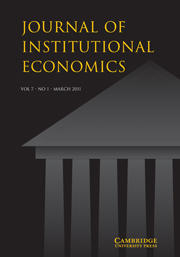John Searle on the concept of political power, the power of states and war-making
Ny artikkel av Professor Thorvald Gran i Journal of Institutional Economics, publisert av Cambridge Journals. Artikkelens fulle tittel er "John Searle on the concept of political power, the power of states and war-making: why states demand a monopoly of the organisation and use of soldiers".
Main content
Abstract
John Searle has developed a strong theory of how speech acts and agreements generate institutions. How is the general theory specified for political institutions? He, like Max Weber, suggests that a government monopoly of soldiers is a condition for the existence of political institutions. However, governments' wielding of force is only political if those attacked consider the attack a responsible and a morally acceptable act. All political power in Searle's theory is deontic. It is assigned as a right, an obligation or the like, as a status function. If power wielding by a government is not assigned, it is beyond the political; it is only brute force. My contention is that this distinction limits the power of Searle's theory in the analysis of politics. From the idea of political institutions as ultimate institutions in a specific, bordered territory it is the strong idea of deonticity that is misleading. Ultimate institutions cannot by definition have externally assigned status. Leaders of other ultimate institutions can accept their existence, but then mainly because they have the military power to defend their borders. Nation states, demanding territorial sovereignty, therefore logically demand a monopoly of soldiers. This sovereignty seen over time suggests an evolutionary first principle of political institutions.
